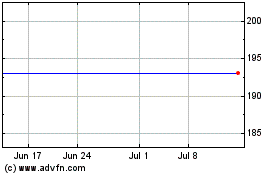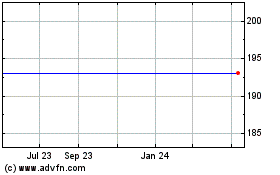By Jonathan D. Rockoff, Liz Hoffman and Richard Rubin
Pfizer Inc. and Allergan PLC terminated their planned $150
billion merger after the Obama administration took aim at the deal
that would have moved the biggest drug company in the U.S. to
Ireland to lower its taxes.
Pfizer will pay Allergan a breakup fee of $150 million. The
breakup fee is relatively small, especially given Pfizer's market
value of some $200 billion.
The Wall Street Journal reported Tuesday that Pfizer's board had
voted to halt the combination and the New York-based pharmaceutical
company then notified Dublin-based Allergan.
The decision to walk away is the latest setback in Pfizer's
long-running efforts to overcome what Chief Executive Ian Read has
said was the company's competitive disadvantage with foreign rivals
that faced significantly lower tax bills.
In addition, the failed deal also hurts Pfizer's plans to break
itself up. Company executives have considered splitting the company
for years, but they have been deterred by concerns that its
businesses may not be large enough to stand alone. The Allergan
deal was seen as building the Pfizer's strength in both high-cost,
high-growth drugs as well as older, lower-cost drugs.
Wednesday, Pfizer said it would make a decision about any
potential separation by the end of 2016. The company also noted
that it has "the financial strength and flexibility to pursue
attractive business development" and shareholder-friendly
moves.
Allergan, for its part, said it was disappointed that the Pfizer
deal won't move forward but said its business remains strong. The
company also said it believes the Treasury Department's new
regulations will have no material effect on the company's
stand-alone tax rate, based on a preliminary review.
Allergan added that it would provide an update on its plans to
simplify the company's operations when the company reports its
first-quarter results on May 10, following the completion of its
deal to sell its generics unit to Teva Pharmaceutical Industries
Ltd. That cash-and-stock deal was valued at $40.5 billion when
announced in July.
In midday trading Wednesday in New York, Allergan shares rose
4.1% to $246.21, while Pfizer shares rose 4.4% to $32.73.
The terminated deal is Pfizer's second failure at buying an
overseas company. In 2014, Pfizer had tried but failed to buy
British drugmaker AstraZeneca PLC. Afterward, it looked for a new
partner, before finally reaching terms with Allergan.
By combining with Ireland-based Allergan, Pfizer could not only
cut its tax rate but also get access to the billions of dollars in
revenue it was keeping overseas to avoid paying U.S. taxes on top
of the taxes it had already paid in foreign countries.
The combination also had nontax benefits for Pfizer, including
access to Allergan's portfolio of strongly growing products like
antiwrinkle treatment Botox, dry-eye treatment Restasis and new
irritable-bowel drug Linzess. A combination also might have paved
the way for Pfizer to shed its collection of cash-generating but
older slower-growth drugs.
Tax-inversion deals have become commonplace in U.S. corporate
deal-making. They also have become a talking point in the U.S.
presidential campaign, with certain candidates attacking the
uprooting of American companies and departure of tax receipts.
The tie-up between Pfizer and Allergan, the biggest merger
announced last year -- the busiest ever for takeovers -- was a
particular campaign target. Republican and Democratic presidential
candidates have criticized the deal.
President Barack Obama on Tuesday called corporate inversions,
in which a U.S. company buys a foreign rival and adopts its
lower-tax jurisdiction, one of the "most insidious tax loopholes
out there." Companies that have inverted frequently make more
acquisitions of U.S. companies to bring them on to their lower-tax
platforms.
The problem, Mr. Obama said, isn't that companies are engaging
in illegal activity, but what is legal in the first place.
The government had so far been unable to do much to stop
corporate inversions, but that clearly changed with Monday's
publication of a third installment of proposed rule changes, the
stringency of which came as a surprise to many.
In an effort to crack down on what the Treasury Department calls
"serial inverters," the new regulations would disregard three
years' worth of U.S. acquisitions when determining a foreign
company's size under the tax code.
That complicated the finely tuned math that was crucial for
inversions like Pfizer's to work. To reap maximum benefits,
shareholders of the inverting company should own between 50% and
60% of the combined entity. Between 60% and 80% also works, but the
tax perks are diminished, and above 80%, they are lost entirely. So
U.S. companies need inversion partners that are at least
one-quarter their size, and ideally more like two-thirds.
When the Allergan deal was struck last year, Pfizer's market
capitalization was about $200 billion and Allergan's was about $120
billion. Pfizer's shareholders would own 56% of the combined
company.
But stripping out three years' worth of deals done by Allergan
-- which Treasury certainly would consider a serial inverter --
that math no longer works. Allergan has 395 million shares
outstanding.
It has issued about 260 million shares for big deals, including
the $25 billion takeover of Forest Laboratories and the $66 billion
combination of Actavis and Allergan last year.
Stripping those out leaves about 130 million shares, worth only
about $30 billion. Under the current merger ratio, Allergan
shareholders' stake in the combined company would likely drop into
the high teens.
In other words, in the eyes of Treasury, Allergan would have
been too small to be Pfizer's inversion partner.
The White House denied the new rules were targeted at a specific
company.
"The Treasury Department is not focused on a specific
transaction, it's focused on specific loopholes," White House press
secretary Josh Earnest said. The White House declined to address
the specific Pfizer and Allergan situation, but Mr. Earnest said
the administration would be "pleased" if inversion deals fell
through.
Treasury's new three-year rule, though, is less likely to trip
up other companies that have been pursuing inversions.
Ireland-based Tyco International PLC, the target of Johnson
Controls Inc.'s pending inversion, has made few acquisitions in the
past three years. The same goes for Canada's Progressive Waste
Solutions Ltd., which is Waste Connections Inc.'s intended ticket
out of the U.S. tax net.
Write to Jonathan D. Rockoff at Jonathan.Rockoff@wsj.com, Liz
Hoffman at liz.hoffman@wsj.com and Richard Rubin at
richard.rubin@wsj.com
(END) Dow Jones Newswires
April 06, 2016 12:01 ET (16:01 GMT)
Copyright (c) 2016 Dow Jones & Company, Inc.
Allergan (NYSE:AGN)
Historical Stock Chart
From Mar 2024 to Apr 2024

Allergan (NYSE:AGN)
Historical Stock Chart
From Apr 2023 to Apr 2024
